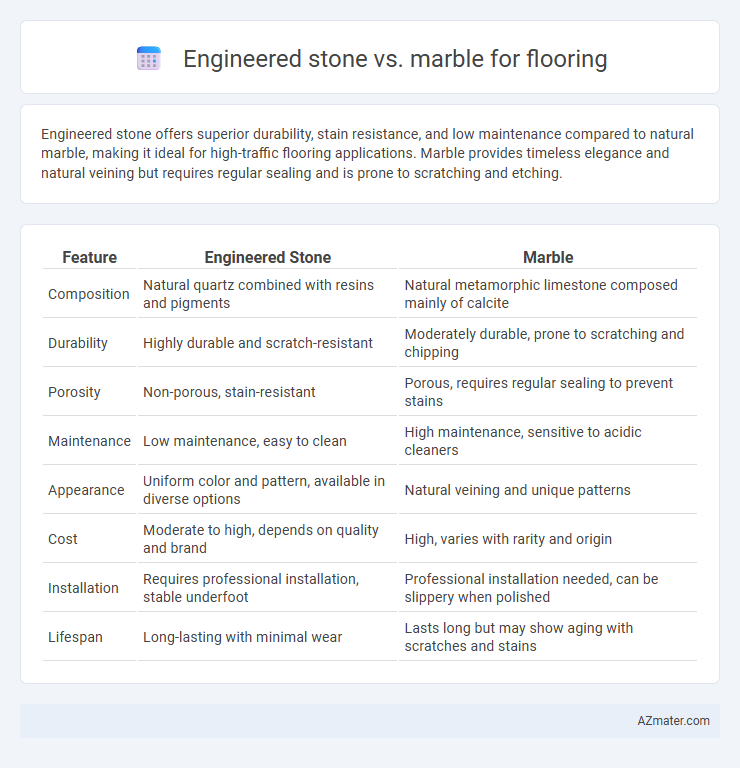Engineered stone offers superior durability, stain resistance, and low maintenance compared to natural marble, making it ideal for high-traffic flooring applications. Marble provides timeless elegance and natural veining but requires regular sealing and is prone to scratching and etching.
Table of Comparison
| Feature | Engineered Stone | Marble |
|---|---|---|
| Composition | Natural quartz combined with resins and pigments | Natural metamorphic limestone composed mainly of calcite |
| Durability | Highly durable and scratch-resistant | Moderately durable, prone to scratching and chipping |
| Porosity | Non-porous, stain-resistant | Porous, requires regular sealing to prevent stains |
| Maintenance | Low maintenance, easy to clean | High maintenance, sensitive to acidic cleaners |
| Appearance | Uniform color and pattern, available in diverse options | Natural veining and unique patterns |
| Cost | Moderate to high, depends on quality and brand | High, varies with rarity and origin |
| Installation | Requires professional installation, stable underfoot | Professional installation needed, can be slippery when polished |
| Lifespan | Long-lasting with minimal wear | Lasts long but may show aging with scratches and stains |
Introduction to Engineered Stone and Marble Flooring
Engineered stone flooring consists of crushed natural stones like quartz mixed with resin and pigments to create a durable, non-porous surface ideal for high-traffic areas. Marble flooring is a natural metamorphic rock characterized by unique veining patterns and a luxurious appearance but requires regular sealing to prevent staining and etching. While engineered stone offers greater resistance to scratches and moisture, marble provides unmatched elegance and a timeless aesthetic in interior design.
Composition and Material Differences
Engineered stone flooring consists primarily of crushed quartz mixed with resin and pigments, offering high durability and resistance to stains and scratches. Marble is a natural metamorphic rock composed mainly of calcite, known for its unique veining and softer surface that is prone to etching and scratching. The synthetic resin in engineered stone enhances its non-porous properties, while marble's natural calcite structure requires regular sealing to prevent damage.
Aesthetic Appeal and Design Options
Engineered stone offers a wide range of colors, patterns, and textures that mimic natural marble while providing greater design flexibility and consistency in appearance. Marble flooring delivers timeless elegance with unique veining and natural variations, enhancing the sophistication of any space. Engineered stone is often preferred for modern designs due to its customizable aesthetics and uniform finish, whereas marble appeals to those seeking classic luxury and organic beauty.
Durability and Wear Resistance
Engineered stone offers superior durability and wear resistance compared to marble, making it ideal for high-traffic flooring applications. Composed of natural quartz and resin, engineered stone resists scratches, stains, and impacts better than marble, which is prone to etching and chipping due to its softer calcite composition. This robust performance ensures engineered stone floors maintain their appearance longer under daily wear and heavy use.
Maintenance and Cleaning Requirements
Engineered stone flooring offers superior durability and low maintenance compared to marble, requiring only mild soap and water for regular cleaning without the need for sealing. Marble floors demand frequent sealing and specialized cleaning products to prevent staining and etching from acidic substances. Both materials benefit from prompt spill cleanup, but engineered stone's non-porous surface significantly reduces the risk of damage and maintenance frequency.
Cost Comparison: Engineered Stone vs Marble
Engineered stone offers a more cost-effective option for flooring compared to marble, with prices typically ranging from $40 to $70 per square foot, whereas marble can cost between $50 and $150 per square foot depending on the quality and source. Installation expenses for engineered stone are generally lower due to its ease of handling and uniform slab sizes, reducing labor time and complexity. Long-term maintenance costs also favor engineered stone, as it is more resistant to staining and requires less frequent sealing than marble, making it a budget-friendly choice overall.
Installation Process and Considerations
Engineered stone flooring offers a more straightforward installation process compared to marble, requiring less specialized labor and time due to its consistent thickness and durability. Marble installation demands precise handling and skilled craftsmen to address its natural variations and susceptibility to chipping or cracking during cutting and placement. Considerations for engineered stone include compatibility with underfloor heating and moisture resistance, while marble floors require sealing and ongoing maintenance to preserve their appearance and prevent staining.
Environmental Impact and Sustainability
Engineered stone flooring offers a more sustainable option compared to marble due to its use of recycled materials and lower quarrying impact, reducing environmental degradation. Marble extraction involves extensive mining, leading to habitat disruption and higher carbon emissions, while engineered stone manufacturing requires less energy and generates minimal waste. Choosing engineered stone supports eco-friendly construction practices by minimizing resource depletion and promoting long-term durability with low maintenance requirements.
Suitability for Different Spaces
Engineered stone offers superior durability and resistance to stains, making it ideal for high-traffic areas like kitchens and commercial spaces where moisture and impact are frequent. Marble, known for its elegant and natural veining, suits low-traffic zones such as bedrooms and formal living rooms where aesthetic appeal is prioritized over heavy wear. Both materials require specific maintenance protocols, with engineered stone needing less upkeep compared to the porous nature of marble, which is more susceptible to scratching and etching in busy environments.
Pros and Cons Summary
Engineered stone flooring offers high durability, resistance to stains, and low maintenance, making it ideal for high-traffic areas, while marble provides a luxurious, natural aesthetic with unique veining but is prone to scratching and requires regular sealing. Engineered stone's non-porous surface enhances hygiene and resists moisture, whereas marble's porous nature increases susceptibility to stains and damage from acidic substances. Cost-wise, engineered stone is typically more affordable and easier to install, whereas marble boasts timeless elegance but demands higher investment and upkeep.

Infographic: Engineered stone vs Marble for Flooring
 azmater.com
azmater.com